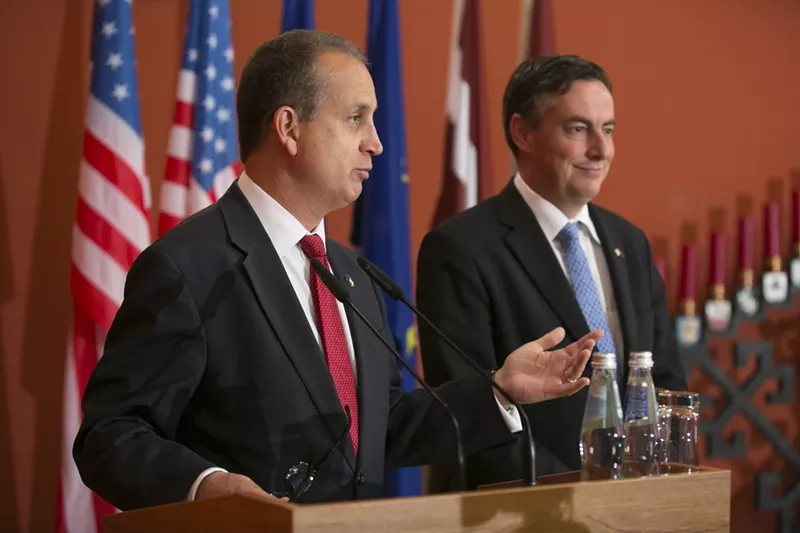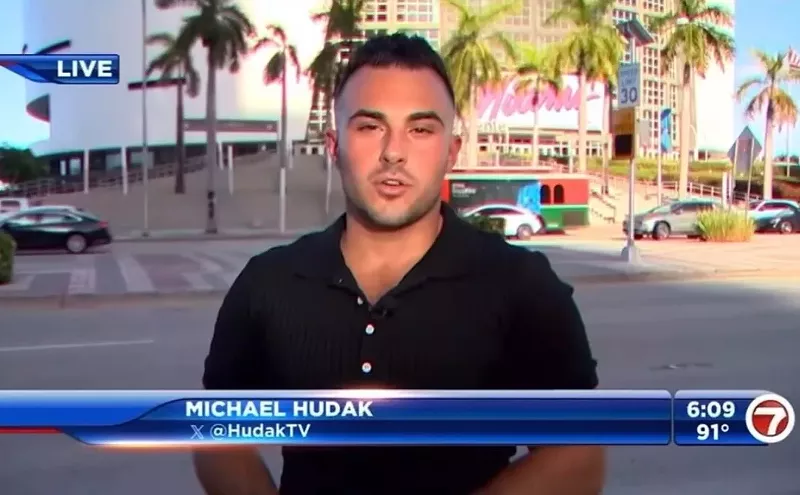Miami Congressman Mario Diaz-Balart definitely, totally, absolutely hasn't been trying to trade his vote for "Trumpcare" for control over the Trump administration's Cuba policy, the congressman's spokesperson tells New Times.
Just minutes before the scheduled high-stakes vote, such is the surreal world of political intrigue in which Diaz-Balart now finds himself. Moments before Rep. Paul Ryan sprinted to the White House to admit his Obamacare repeal plan might not pass, Diaz-Balart announced his support for the so-called American Health Care Act (AHCA).
But the decision was not without controversy: Rumors have swirled for weeks that the congressman, whose central issue for decades has been crippling the Castro regime, has been lobbying the Trump administration to reverse Barack Obama's changes to U.S.-Cuba policy. (Diaz-Balart is Fidel Castro's former nephew by marriage.)
This week, with the vote for Ryan's Obamacare repeal riding on a razor's edge, Diaz-Balart was one of the final undecided votes — and rumors began to swirl yet again that he would trade the well-being of thousands of his constituents (it's estimated some 360,000 Miamians could lose their health coverage under the AHCA) for some assurances that Donald Trump would reverse the trend in Cuban relations.
Wednesday, the New York Times reported Diaz-Balart had reached out to the White House to make clear that he wanted "assurances" he would get his way on Cuba before he stood up for the AHCA. (The Times initially reported that a deal had been made, but the newspaper later retracted that portion of the report.)
But Diaz-Balart spokesperson Katrina Valdes told New Times yesterday that the Gray Lady's report was entirely off-base.
"Once again, the New York Times is categorically and factually incorrect in their reporting," she said via email yesterday. "If they had done their basic journalistic duty and placed a simple, 30-second call to my office, they would have known their facts were wrong.” Valdes did not immediately respond to a follow-up email today, and New Times was unable to reach her via phone to ask, flatly, whether Cuba policy influenced Diaz-Balart's decision today.
But one Miami political insider with deep knowledge of Cuban-American policy says Diaz-Balart has openly attempted to strike a deal this year to reverse the Obama administration's Cuba concessions. "This is a pretty blatant example of political prostitution where everyone is just getting fucked — both his constituents and the Cuban people," the source told New Times. "The only people who will be hurt by Diaz-Balart's Cuba quid pro quo are ordinary Cubans."
Diaz-Balart told the Miami Herald today that he decided to jump on the rapidly sinking ship that is the AHCA because $15 billion in support for mental-health care and substance abuse were written into the bill Tuesday in a last-ditch effort to drum up support. The congressman said his vote was "not about politics," a charge that does not pass any sort of political smell test.
For example, the Herald yesterday reported that Diaz-Balart wouldn't say whether he'd spoken to Vice President Mike Pence and wouldn't confirm whether his office had been circulating a "Trump Approach to Cuba" memo to other members of Congress. An anonymous source confirmed to the Herald that Diaz-Balart had written it, though.
Cuban-American political consultants and pollsters have long speculated that Diaz-Balart is angling to become Trump's top consultant when it comes to Cuban-American policy. Diaz-Balart has long been adamant that Trump reverse Obama's changes to U.S.-Cuba policy — including reversing Obama's decision to end the controversial "Wet Foot, Dry Foot" immigration policy, which allowed undocumented Cuban immigrants who reached American soil to qualify for expedited citizenship procedures.
Diaz-Balart's proposals — to reverse any and all diplomatic relations with Cuba until the Castro regime either relinquishes power or makes major human-rights advances — has seemed increasingly outdated. Obama said his policy proposals were aimed at helping Cuban citizens gain the ability to trade with the United States; Diaz-Balart has long maintained that Obama's rule changes have benefited no one but the Castros.
But while Diaz-Balart fancies himself a champion for the civil rights of those trapped living under repressive regimes, he's been totally fine meeting with leaders of other restrictive nations. On January 31, the congressman hosted Jordan's King Abdullah II, the leader of a country that also bans free speech and expression.
"It's pretty clear that for Diaz-Balart, this is just a personal family feud," the Miami political insider says. "Cuba's human rights problems are no worse than other nations whose leaders he's fine meeting with. He really could not care less about the Cuban people or his community."

Audio By Carbonatix
[
{
"name": "GPT - Billboard - Slot Inline - Content - Labeled - No Desktop",
"component": "22004575",
"insertPoint": "2",
"requiredCountToDisplay": "2"
},{
"name": "STN Player - Float - Mobile Only ",
"component": "22595215",
"insertPoint": "2",
"requiredCountToDisplay": "2"
},{
"name": "Editor Picks",
"component": "17482312",
"insertPoint": "4",
"requiredCountToDisplay": "1"
},{
"name": "Inline Links",
"component": "18711090",
"insertPoint": "8th",
"startingPoint": 8,
"requiredCountToDisplay": "7",
"maxInsertions": 25
},{
"name": "GPT - 2x Rectangles Desktop, Tower on Mobile - Labeled",
"component": "23181625",
"insertPoint": "8th",
"startingPoint": 8,
"requiredCountToDisplay": "7",
"maxInsertions": 25
},{
"name": "Inline Links",
"component": "18711090",
"insertPoint": "8th",
"startingPoint": 12,
"requiredCountToDisplay": "11",
"maxInsertions": 25
},{
"name": "GPT - Leaderboard to Tower - Slot Auto-select - Labeled",
"component": "17720761",
"insertPoint": "8th",
"startingPoint": 12,
"requiredCountToDisplay": "11",
"maxInsertions": 25
}
]












